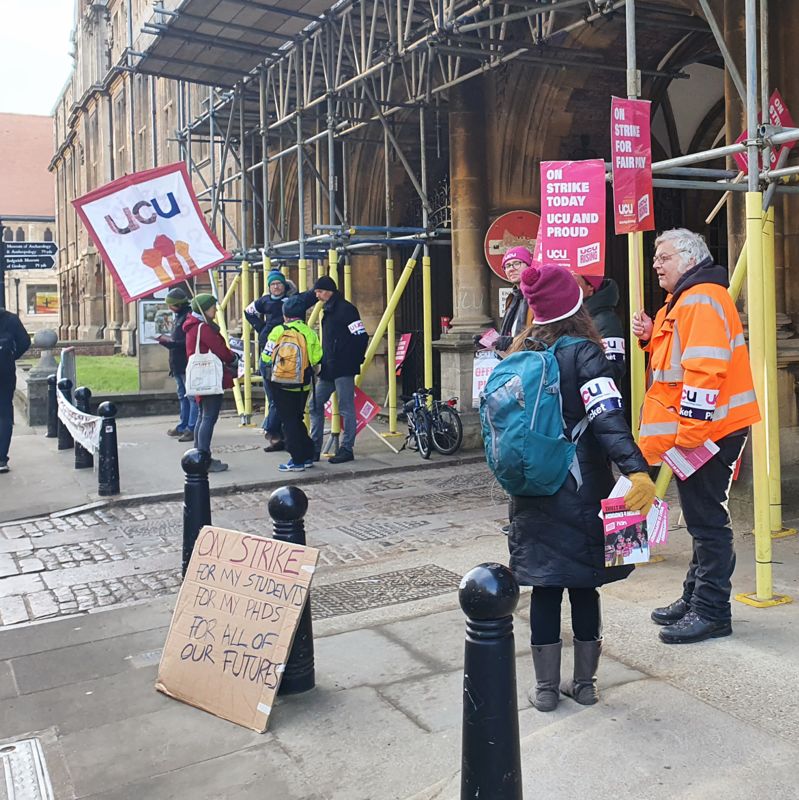
Apropos UK data released today by the Office for National Statistics (ONS), modern monetary theorist and tax specialist Richard Murphy comments that:
The deliberate choice by the government to prevent market-matching pay settlements in the public sector is only rational if you realise that their aim is twofold. One is to force people out of public sector employment because they can no longer afford to work in it. The second is to destroy those services. I cannot fund [sic] another explanation for such stupidity.
I agree, and have sympathy with the MMT understanding of tax and expenditure which informs such a conclusion. 1 While there is much that he and I differ on, not least his simplistic view of the Ukraine War, Britain’s public sector is indeed being deliberately run down. In a recent post I spoke of:
… the implications not only for hundreds of millions of western labour-sellers now surplus to the requirements of private profit, but for the social and welfare infrastructures it once suited capital to maintain, but are now being dismantled.
Two narratives aid that dismantling. One is the homely but specious likening of a nation’s cash flows to those of a household, business or local government. This conflates monetary and fiscal policy with the real economy, and whether through mendacity or ignorance overlooks the truth that a sovereign issuer of a fiat currency can never ‘run out of money’. (It can suffer inflation but this, contrary to the myth that governments tax in order to spend, is managed fiscally by taxing an overheated economy, and monetarily by adjusting interest rates. 2 ) Misbegotten efforts to ‘balance the budget’ and ‘lessen the burden of debt on our grandchildren’ wreak havoc on the real economy and so ensure a bleak future for those of ‘our grandchildren’ not born to the 1%.
(Even if we do, miraculously, mitigate the thermonuclear and ecocidal logic of wealth creation for the enrichment of the few.)
The second narrative is more specific. Education, health and welfare infrastructures are being run down under cover of post 2008 “austerity”. In reality it is because western capital, having outsourced jobs to the global south, now has less need of trained and healthy labour-sellers at home. 3
(Though the rentiers in whose interests western states have been run for at least four decades do require an elite of relatively privileged consumers; not only for goods made in Asia – and marked up astronomically in what it pleases economists to call “the value chain” 4 – but also for finance, insurance and real estate ‘products’ , the unearned and unproductive returns on which uselessly boost GDP and derive from their monopoly on the renting out of land and money. 5 )
I agree too with Professor Murphy’s frequently voiced assessment, here for instance, that the British Labour Party currently offers palliative solutions at best. But implicit in his worldview is the notion that Labour, under better leadership, is capable of offering meaningful resistance to the class onslaught his post today recognises in all but name.
It is not. Even the mildly socialist policies put forward on Jeremy Corbyn’s watch were too much for Britain’s rulers. Aided by the most vicious campaign ever waged against a party leader, in which every wing – liberal as much as conservative, ‘quality’ as much as tabloid – of corporate media played its part with gusto …

… Corbyn was ousted and Labour returned to safer hands, as befits its role as Her/His Majesty’s Loyal Opposition. Which is to say, a party to which Britain’s ruling class may turn without fear when its A-team has so royally fucked up as to need a spell on the benches.
His undoubted economic insights lacking the corresponding rigour of class analysis, Richard Murphy is blind to the truth expressed by this steel city reader; a British expat long residing in Canada. In the context of the Liz Truss meltdown last autumn, bevin wrote:
The natural political division in the UK right now is between Blairism and Socialism. Truss is not the first Tory PM to dissolve on contact, she is the fourth in less than a decade. The Tory ‘brand’ is no longer fit for purpose – Blairism serves the ruling class far better. And when it is opposed by Toryism it is unbeatable because the only alternative is a clumsier version of itself.
* * *
- Marxist opposition – including my own in the past – to MMT frequently derives from the misapprehension that money is a commodity, hence subject to the law of value. It is not, as Michael Hudson and Radhika Desai argue, in a recent dialogue reproduced on Naked Capitalism (with a foreword by Yves Smith which, while sympathetic, distances her from Professor Hudson’s and Ms Desai’s “overstating” of the speed at which the world is de-dollarising). Nor did Marx, in Capital II and III, see it as such.
- The MMT thesis that sovereign governments create money in order to spend, and raise or lower taxes in order to control the amount of money in the economy, is not prescriptive. It is a description of what literally happens. Insofar as MMT is ‘progressive’ it argues for leveraging that reality to drive an economy at full productive capacity, a central measure of which is full employment. One of my issues with MMT is its naivety in supposing that capitalist economies could possibly – other than in emergencies, most obviously wartime – see full employment, with its attendant boost to labour bargaining power, as desirable. (Whatever their tame politicians may say – or for that matter believe.)
- Last September, apropos reforms beginning with Britain’s mid 19th century factory acts, food adulteration acts, public sanitation projects etc – and culminating in the post WW2 welfare state – I wrote that:
I don’t doubt that Lord Shaftesbury was genuinely horrified by children in coal mines; Charles Dickens by the street urchins he immortalised in Oliver Twist. Nor that such widely aired moral outrage expedited parliamentary action. But insofar as it marched in step with more material drivers of change, it pushed at doors already opening. Humanism is blind to such realities, inclining us to a rose-tinted reading of modern history as the onwards and upwards march of Enlightenment values. Does this matter? Yes. It leaves us wrongfooted by the reversal of gains made under one set of material circumstances – which under capitalism equate to the needs, some more obvious than others, of Profit – when those circumstances change.
- In footnote 1 to the post just cited, I wrote:
‘Value’ in the sense used here is not to be confused with ‘value chain’ theory, whose rise to economic orthodoxy came at just the right time to legitimate huge mark ups on a shirt made in Bangladesh, an iPhone in China. In attributing vastly more ‘value’ to packaging, sales and marketing of goods in the West than to their manufacture overseas, value chain theory conflates value as utility, and value as metric of exchange. In this way exploitation of the global south is rationalised as the addition of oodles of usefulness to shirt and cell phone …
- I don’t say the renting out of money is always to relatively privileged elites, as is the case with mortgages, student loans and, at the high end, loans to corporate raiders for share buy-outs. Wonga may have failed but the ongoing phenomenon of pay-day loans shows that poverty too can be profitable.
